Happy Wednesday! If you are upset about the end of Brat Summer, never fear! Republicans on the House Committee on Agriculture have given us Farm Bill Fall.
Up to Speed
- Vice President Kamala Harris and former President Donald Trump agree on this much: The vice president is the underdog in the race for the White House; the former president is the frontrunner. That’s the view the Democratic and Republican nominees claimed to share in dueling campaign memorandums outlining the state of the November contest at the outset of September. “Make no mistake: we head into the final stretch of this race as the clear underdogs,” Harris campaign chair Jen O’Malley Dillon wrote in a Sunday memo. Over at Trump campaign headquarters, chief strategists Chris LaCivita and Susie Wiles offered a similar assessment. “If the election were held today, Donald Trump would be reelected,” they wrote in a Tuesday memo. Labor Day marks the traditional acceleration of the fall campaign season. According to the polls, Harris versus Trump is a toss-up.
- A network of Republican operatives and lawyers is attempting to ensure third-party candidates are on the ballot in multiple key swing states, which could draw votes away from Harris, per an Associated Press report from Monday. GOP operatives have gathered ballot petition signatures for independent candidate Cornel West in North Carolina and Green Party candidate Jill Stein in New Hampshire. Republican-aligned lawyers have also defended West against challenges to his appearance on the ballot in such states as Michigan, Pennsylvania, and Georgia.
- Republican Voters Against Trump made an $11.5 million ad buy, its largest reservation yet, targeting voters in swing states, The Hill reported Tuesday. The biggest investment is $4.5 million in Pennsylvania, and the group is also targeting voters in Michigan, Wisconsin, Arizona, and Nebraska’s 2nd Congressional District, as the state gives two of its five electoral votes to the statewide winner and allocates the rest based on the results from its three House seats. An ad from the group features people who previously voted for Trump and plan to choose Harris in November. “We help elevate the voices of these disaffected Republicans and build a permission structure for many other traditional GOP voters to reject Donald Trump and his MAGA movement, even if it means voting for Democrats with whom they might have policy differences,” Sarah Longwell, the group’s executive director, told the outlet.
- Republicans who lead campaign arms for the party in the Senate and the House of Representatives have expressed concern about their candidates’ fundraising disadvantage compared to their Democratic counterparts, Politico reported Tuesday. Democratic Senate candidates are outspending their Republican opponents by tens of millions of dollars in Arizona, Wisconsin, and Nevada, and by more modest sums in Montana and Michigan. Meanwhile, spending for the Senate race in Ohio is roughly equal, and Republican Senate candidates in Pennsylvania and Maryland are winning the spending battle over their Democratic counterparts. On the House side, where the GOP effectively has a seven-seat majority, at least seven vulnerable Republicans had less cash on hand than their opponents at the end of June.
- The largest super PAC boosting House Republicans, the Congressional Leadership Fund, reserved $16 million in ad reservations to help GOP candidates in 11 battleground districts, Punchbowl News reported Tuesday. The largest investments are in Pennsylvania’s 7th Congressional District, where Ryan Mackenzie is trying to unseat Rep. Susan Wild; Virginia’s 7th District to help Derrick Anderson defeat Eugene Vindman for the seat Rep. Abigail Spanberger is leaving; and in Michigan’s 7th, where Tom Barrett, who lost to current Democratic Senate candidate Rep. Elissa Slotkin in 2022, hopes to defeat Curtis Hertel and win the seat this time. The super PAC had earlier reserved $141 million in reservations, which pales in comparison to a $210 million reservation from House Majority PAC, CLF’s Democratic counterpart.
GOP Operatives Question Outside Group’s Turnout Work in Arizona and Wisconsin
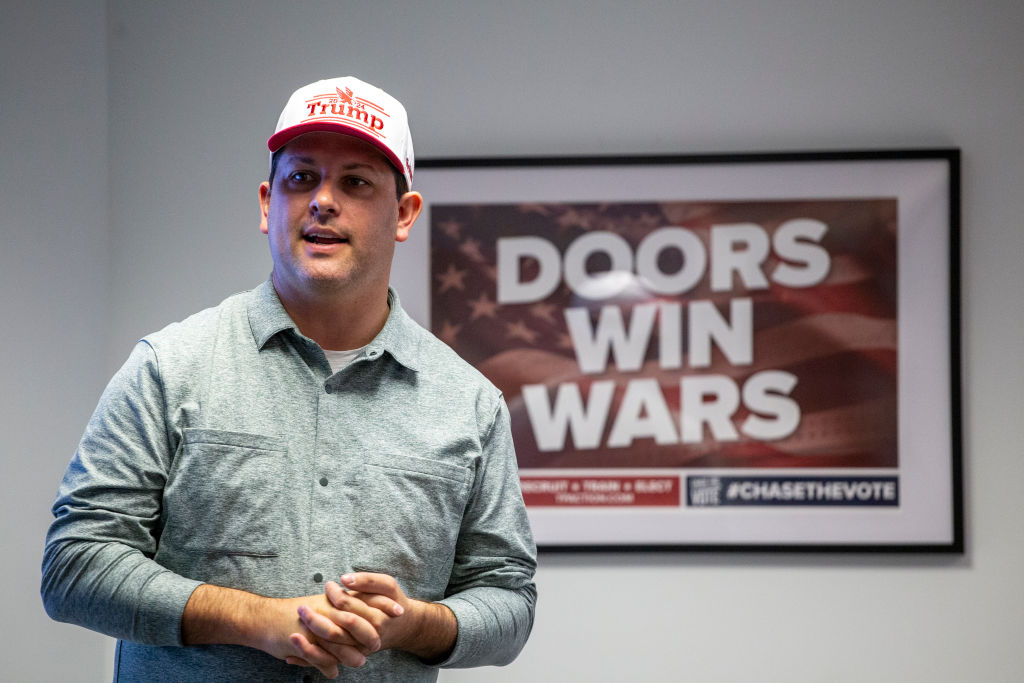
A political nonprofit affiliated with Turning Point USA plans to deploy “hundreds” of paid field staff to Arizona and Wisconsin as part of a turnout operation targeting occasional voters inclined to support Republican nominee Donald Trump this fall if they can be herded to the polls. Yet some veteran GOP operatives doubt the group will deliver as advertised.
Turning Point Action aims to play a key role in Republican get-out-the-vote efforts in the wake of Trump directing the Republican National Committee to delegate ground game activities to GOP-aligned outside groups. The group tells Dispatch Politics it is focusing on low-propensity voters who did not pull the lever in either 2016, 2020, or both elections, but who are registered Republicans or lean conservative on the issues.
Turning Point Action claims it has identified roughly 300,000 such voters in Arizona and the same number in Wisconsin, both crucial battleground states. Based at Turning Point USA headquarters in Phoenix and a field office the group says it opened in the suburban Milwaukee community of Waukesha, Wisconsin, Turning Point Action tells us its field staff is knocking on doors, sending text messages and making phone calls. The group is still hiring workers, even recruiting from outside each targeted state, offering to lodge employees in local hotels.
“We think there’s a lot of meat on the bone in areas we consider deep-red areas, so that’s where we’ve deployed our resources,” Turning Point Action spokesman Andrew Kolvet said in a telephone interview just before Labor Day.
The RNC, in conjunction with the Trump campaign, is still handling some of the party’s ground game activities, as James Blair, political director for both organizations, likes to remind people. But various outside groups are shouldering a significant portion of this work, with different entities taking the lead in different swing states. For example, Sentinel Action Fund is active in Pennsylvania (and elsewhere) and the Republican Leadership Fund is working in Nevada, targeting voters unaffiliated with either the Democratic or Republican parties.
Turning Point USA, a political group active on college campuses nationwide and focused on increasing support for Trump and other Republicans among younger voters, had via founder Charlie Kirk been a fierce critic of the RNC’s voter turnout operation. So this cycle, Turning Point USA charged its 501(c)(4) sister organization, Turning Point Action, with spearheading a field program of its own. Thus far, the group has prioritized voter turnout in Arizona and Wisconsin. Its chief strategist and day-to-day manager of the operation is Turning Point Action chief operating officer Tyler Bowyer, a former RNC committeeman from Arizona.
However, multiple Republican sources Dispatch Politics interviewed in the course of reporting this story questioned claims Turning Point Action is making about the extent of its efforts in those two states. Trump leads Vice President Kamala Harris by 0.5 percentage points in Arizona, per the polling averages; the Democratic nominee leads the former president by 1.4 points in Wisconsin. Both razor-thin margins suggest the ground game matters.
Dispatch Politics spoke with more than half-dozen Republicans operatives based either in Arizona and Wisconsin who are involved in GOP voter turnout or who track the party’s canvassing efforts. Some of these Republican insiders, requesting anonymity to speak candidly, said they were only mildly aware of Turning Point Action’s work, if at all. Others were broadly up to speed on the group’s presence in Arizona and Wisconsin, but were unaware of specifics like staffing levels, the number of field offices, and what sort of GOTV activities the group is engaged in.
“Standard metrics like number of staff, offices, doors knocked and voters targeted is not something being shared or promoted as far as I can tell,” a Republican operative monitoring Wisconsin said. Added a second knowledgeable GOP operative who is involved in turning out Republican voters in multiple states: “Big press releases, big tweets, lots of smoke, very little work. That’s my assessment” of Turning Point Action.
As an example, this operative pointed to a Turning Point Action digital fundraising appeal signed by Kirk that claimed the group was “deploying full-time BALLOT CHASERS in ARIZONA, WISCONSIN, NEVADA and MORE” (emphasis added). But by the group’s own admission, its activities are limited to the Grand Canyon and Badger states. Additionally, the fundraising appeal offered to “MATCH EVERY DOLLAR you give before our August 31 deadline.” Promises to “match” grassroots contributions is considered a dubious strategy for encouraging such giving.
Further, it’s unclear if Turning Point Action is sharing the voter data it gathers from knocking on doors, telephoning, and texting with the other Republican-aligned ground game groups. Most upload their data on a near daily basis to Data Trust, the party’s hub for sharing voter turnout information. Doing so facilitates coordination among outside groups, campaigns, and the Republican Party, while preventing confusion and duplication of efforts.
The knowledgeable GOP operative who criticized Turning Point Action said definitively that the group is not using Data Trust. When Dispatch Politics asked Kolvet if that was in fact the case, he equivocated before saying he needed to investigate the matter further. No clarification was provided as of Wednesday morning at publication time, despite multiple follow-up requests for the information.
Asked why so many dialed-in Republican operatives seem in the dark about Turning Point Action’s voter turnout activities this cycle, Kolvet responded: “I find that surprising.” He pointed to a New York Times profile of the group published in April and emphasized that the Trump campaign and the RNC are apprised of its work. “The comment from my team member, just now, on that was to the point: ‘Anyone who doesn’t know what we’re up to is not a player.’”
Lack of Clarity Clouds Arlington Cemetery Controversy
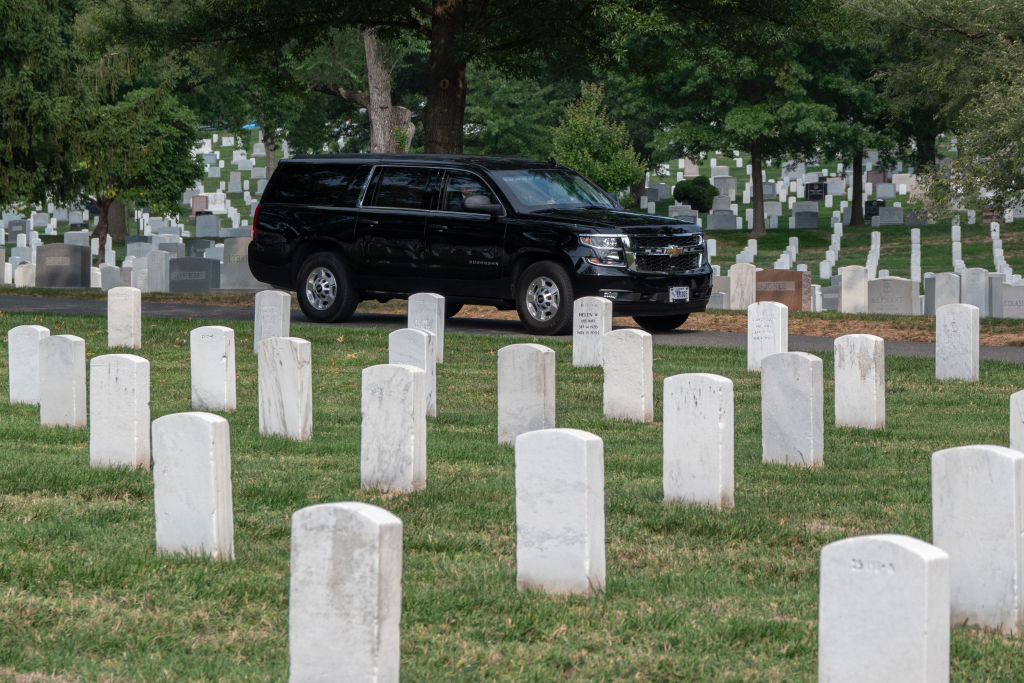
Conflicting claims about an incident during Donald Trump’s visit to Arlington National Cemetery last week have continued to sow confusion about what actually happened while the former president and Republican nominee attended a wreath-laying ceremony at the hallowed military resting place. And despite promising to provide video evidence to make clear what took place, the Trump campaign has yet to do so.
First, an overview of the facts and claims: On August 27, NPR first reported that a day earlier, two of Trump’s campaign staffers “had a verbal and physical altercation” with an official at the cemetery in which “campaign staff verbally abused and pushed the official aside,” according to a source who spoke with NPR. The employee was allegedly trying to prevent the Trump staffers from taking photographs and video in a section of the cemetery where deceased soldiers from Iraq and Afghanistan are buried. A source told NPR that Trump’s group had been informed that only cemetery staff would be allowed to photograph or film in this section, though it’s unclear if this is a regular rule.
Arlington National Cemetery, in a statement, confirmed to NPR last week only that there was “an incident” and that “a report was filed” to police. The cemetery’s statement also noted that federal law prohibits “political campaign or election-related activities” in military cemeteries and that officials “reinforced and widely shared this law and its prohibitions with all participants.”
In its own statement to NPR, the Trump campaign insisted no such thing happened. “There was no physical altercation as described and we are prepared to release footage if such defamatory claims are made,” said Steven Cheung, communications director for the Trump campaign. “The fact is that a private photographer was permitted on the premises and for whatever reason an unnamed individual, clearly suffering from a mental health episode, decided to physically block members of President Trump’s team during a very solemn ceremony.”
Later last week, the U.S. Army, which maintains Arlington National Cemetery, released what it claims is its final statement on the matter. “Participants in the August 26th ceremony and the subsequent Section 60 visit were made aware of federal laws, Army regulations and DoD policies, which clearly prohibit political activities on cemetery grounds. An ANC employee who attempted to ensure adherence to these rules was abruptly pushed aside,” reads the statement credited to an Army spokesperson and provided to Dispatch Politics.
The incident has caused a political firestorm. Media coverage focused on the possibility that Trump’s campaign violated the law or, at the very least, disrespected fallen veterans by using the visit to boost his campaign. Republicans have pushed back by noting that Trump had been invited to the cemetery by the families of fallen veterans who have defended the former president’s appearance and conduct there. The ceremony took place on the third anniversary of the Taliban attack on the Kabul airport during the American withdrawal from Afghanistan that left 13 American service members dead. Trump has since used images of his visit to the cemetery to make a case against the Biden administration’s handling of the withdrawal.
Vice President Kamala Harris weighed in last weekend by chastising Trump and saying Arlington National Cemetery is “not a place for politics.” Sen. Tom Cotton of Arkansas, a Trump ally and a veteran of the Army regiment known as the Old Guard whose soldiers conduct funeral ceremonies at the cemetery, defended Trump in a statement Saturday night. Cotton claimed that “political apparatchiks working for the incompetent secretary of the Army disrespected” the families who invited Trump.
But just as it seemed the story would subside over the holiday weekend, Trump himself commented Tuesday on his Truth Social site. “There was no conflict or ‘fighting’ at Arlington National Cemetery last week. It was a made up story by Comrade Kamala and her misinformation squad,” Trump said.
When asked to respond to Trump’s claim that the story about the incident was “made up,” the Army referred Dispatch Politics back to its original statement. The Army spokesperson did not provide any additional evidence that the incident happened as the statement described.
The Trump campaign, meanwhile, has still not released any video evidence that contradicts the NPR report or the Army’s statement. Dispatch Politics asked Cheung when he would be releasing the footage he claimed the campaign was prepared to make public, but the spokesman did not respond.
Notable and Quotable
“American politics is highly gangster-like activity.”
—Independent presidential candidate Cornel West in the Associated Press’ report on a Republican network trying to prop him up to hurt Vice President Kamala Harris, September 2, 2024
Correction, September 4, 2024: A previous version of this article misstated the date on which NPR reported on former President Donald Trump's visit to Arlington National Cemetery. It was August 27.



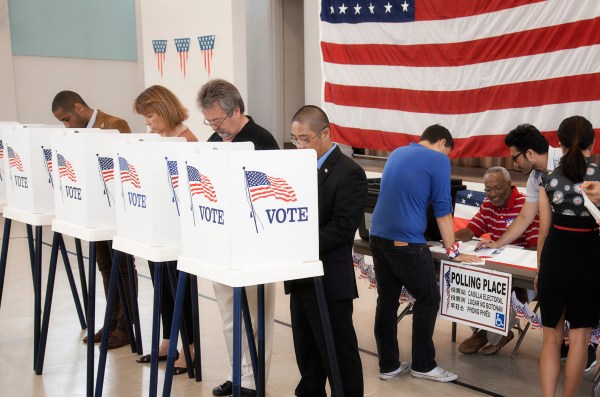
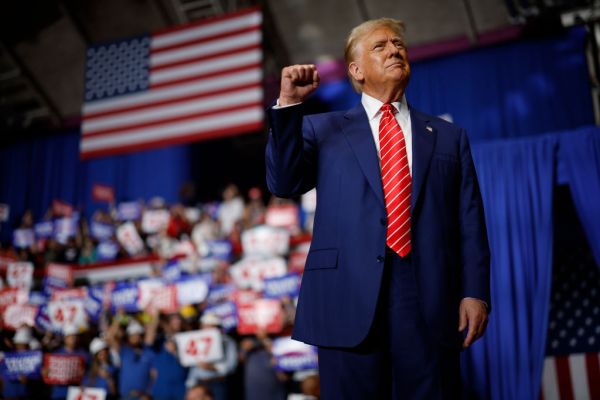
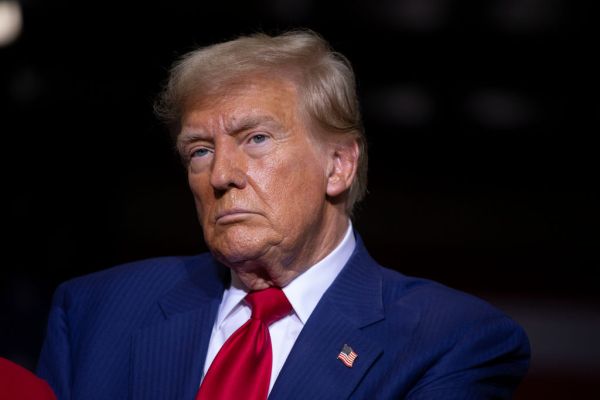
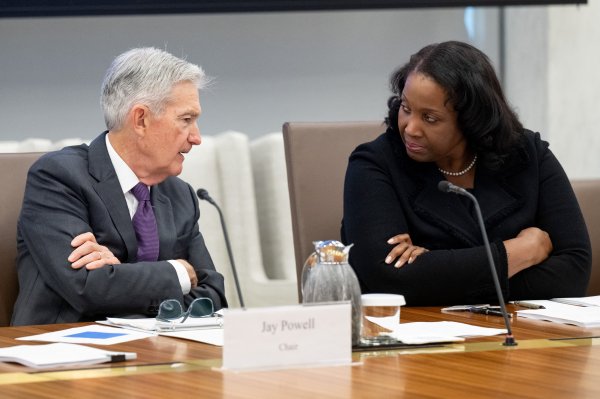
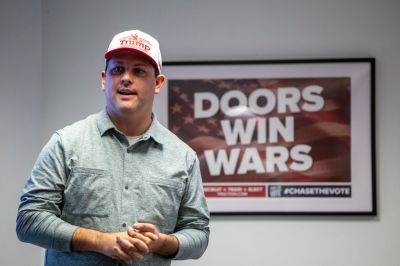
Please note that we at The Dispatch hold ourselves, our work, and our commenters to a higher standard than other places on the internet. We welcome comments that foster genuine debate or discussion—including comments critical of us or our work—but responses that include ad hominem attacks on fellow Dispatch members or are intended to stoke fear and anger may be moderated.
With your membership, you only have the ability to comment on The Morning Dispatch articles. Consider upgrading to join the conversation everywhere.